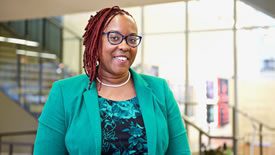Lewis to research black girlhood during National Humanities Center residency

Associate Professor of English Janaka Bowman Lewis will spend four weeks this summer in residency at the National Humanities Center in the Research Triangle Park, working on the project, “Black Girlhood and the Power of Belonging.” Lewis will join a select group of about 40 scholars from across the nation who were chosen to conduct research in residency at the center.
During the residency, Lewis will use literature and media to complete a chapter for the monograph on which she currently is working, titled “Black Girlhood and Narratives of Play.”
“The book discusses narratives written by African American women who go back to the period of childhood to discuss a claim to—and a transition in—their sense of agency and self-identification,” Lewis said. “The chapter I will be working on centers on the argument that narratives of girlhood in the 1970s focused on the power of girls, and specifically black girls, to recognize themselves in media and culture.”
While at the National Humanities Center, she will analyze cultural representations and fictional productions during the 1960s to determine how moments of tragedy and resistance were represented, including the bombing of the 16th Street Baptist Church in Birmingham, Alabama, on Sept. 15, 1963.
“This bombing took the lives of four black girls and injured an additional 22 who were present,” she said. “I will research the parallels in the social analysis of the Civil Rights Movement through the Black Power Movement, and its cultural component the Black Arts Movement, and the representations of black childhood, with a specific focus on what is passed down to black children, and specifically black girls, about the world around them through media.”
The chapter on which she will work during the summer residency discusses how messages of black power reached black children, and girls in particular, and also how African American women authors created and revealed their own sources of power by representation of their own or others’ black girlhood.
The monograph focuses on the significance of representations of African American girls and social engagement in literature and argues that this self-recognition from the perspective of the narrator begins in childhood as the girls represent play as social interaction, from Harriet Jacobs in the 1830s, who is represented in her 1861 narrative “Incidents in the Life of a Slave Girl” to Starr Carter in Angie Thomas’ 2017 novel, “The Hate U Give.”
“In this book, I continue the archive of representation of black girlhood in fiction into the 21st century in an effort to provide a literary history of where this idea of what we now know as ’Black Girl Magic’ comes from, and its significance in American literature,” Lewis said.
Lewis is an associate professor of English, director of the Women’s and Gender Studies program and a faculty affiliate in the Department of Africana Studies in the College of Liberal Arts & Sciences. She teaches courses on 19th and 20th century African American women’s literature and African American archival and material culture.
Read more on the College of Liberal Arts & Sciences website.
Image: Lynn Roberson, CLAS communication director